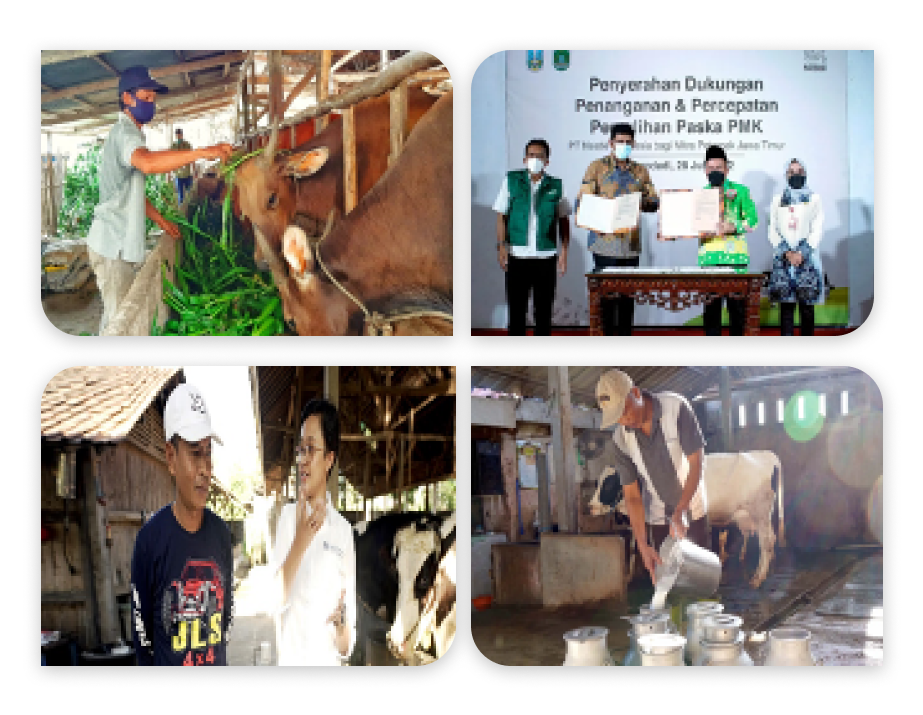WORKING
GROUP - DAIRY
Context:
The dairy industry in Indonesia was undergoing significant changes and facing various challenges. The country's demand for dairy products had been steadily increasing due to population growth and rising incomes, leading to a reliance on dairy imports to meet domestic needs. This had prompted efforts to boost domestic milk production through initiatives such as improved breeding programs, increased dairy cow numbers, and investments in dairy infrastructure. However, Indonesia's dairy industry still struggled with low milk yields per cow, limited access to quality feed, and challenges in milk processing and distribution. Furthermore, there was a growing interest in sustainable and organic dairy farming practices to meet consumer preferences.
Dairy Working Group is, a collaborative partnership encompassing private sector leaders, governmental bodies, non-profit organizations, and smallholder dairy farmers, is wholeheartedly committed to elevating both productivity and livelihoods within the dairy industry while upholding the principles of sustainability. Dairy WG core mission is to empower smallholders with the knowledge, resources, and ethical farming practices required to enhance dairy productivity, reduce environmental impact, and ensure equitable economic benefits. Through initiatives spanning improved animal husbandry, access to veterinary care, sustainable feed production, and fair market access, the initiative not only aims to increase smallholders' dairy yields and income but also champions responsible and environmentally conscious dairy farming. Dairy WG serves as a testament to the transformative power of public-private partnerships, exemplifying how collective efforts can drive positive change, secure the future of the dairy industry, and improve the well-being of rural communities in a sustainable and equitable manner.
Activities :
- - Delivering capacity building to public agricultural vocational schools in Malang and Bogor - through the Teaching Factory for Agricultural Education (TEFA) program - covering Good Agricultural Practices such as designing cow sheds and feeding.
- - Establishing model farms to demonstrate sustainable and profitable smallholder dairy farming.
- - Promoting and facilitating fodder farming (especially maize), the use of nurseries, the distribution of better plant materials and the development of various legumes.
- - Rolling out financing models for farmers to scale from 3-4 cows currently to 8 productive cows.
- - Collaborating with cooperatives to establish and manage rearing farms .
Impact :
- - 27.000 farmers participating, of which around 50% are women.
- - 97% smallholders has access to capacity building.
- - Average productivity around 10 Litre/Cows/Day
CASE STUDY - DAIRY - NESTLE

Program kemitraan terkait susu - Mewujudkan masyarakat Indonesia yang lebih sehat melalui produk-produknya yang berkualitas, bergizi dan lezat rasanya. Selain itu kami juga memfokuskan diri untuk senantiasa memberikan informasi dan pendidikan bagi para konsumen, antara lain seperti tercantum dalam kemasan setiap produk kami. Dalam menjalankan bisnisnya, Nestlé berusaha untuk selalu menjalankan tanggung jawab kepada masyarakat dan menciptakan manfaat.
BEFORE AND AFTER
INCLUSIVE CLOSED LOOP IMPLEMENTATION
| Indicator | Before | After |
|---|---|---|
| Production/Productivity | 9,8 litre/cow/day | Improved by 28.5% to 12,6 litre/cow/day |
| Market Access | Low quality & limited access | Good quality, better market acceptances |
| Financial | Economy impact from milk purchasing 1.1 trillion IDR/yr | trillions IDR/year economy impact from milk purchasing |
| Indicator | Before | After |
|---|---|---|
| Capability Building | lack of awarness on good dairy farming practicess and milk quality | Provided with Good Agriculture Practices by the company |
| Social Impact | Farmers didn't have reguler income |
| Indicator | Before | After |
|---|---|---|
| Innovation and Infrastructure | Free stall system, digitalization, farm cooler | |
| Sustainability | Progressing construction on biogas machine | More than 8500 units of biogas constructed, >21000 water adlibitum facility, >3700 Chopper machine, 660 units milking machine, >4000 stall fan, > 600 exercise barn, manure separator etc. |